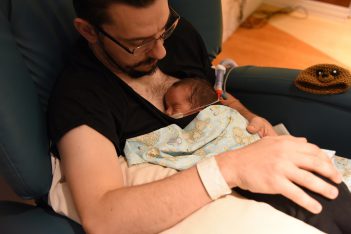By Chris Bavender
IU Health North Hospital’s NICU is the new champion of an international competition known as the Kangaroo Challenge. NICU’s in eight countries competed over 15 days to see which hospital had the highest average of hours in skin-to-skin contact with babies.

“I heard about this event at a developmental care conference a few years ago, and I knew it would be a perfect match for our unit,” said Paula Shaner, manager of clinical operations in the NICU at IU Health North. “This was our third year competing and our first year winning. Last year we almost won, so we felt even more motivated to win this year.”
The challenge started May 1 and wrapped May 15, International Kangaroo Awareness Day. All of the NICU team members participated and decorated patient rooms and hallways with kangaroos to make it a fun experience for the patients and their families.
“Skin-to-skin contact is something we encourage year round, so we always encourage our moms and dads to hold skin to skin. During the competition, we did everything we could to make it a fun environment for our families,” Shaner said. “Families had a passport book and kangaroo stamps, and our nurses stamped one kangaroo in the book for each hour held.”
A total of 19 babies were held during the challenge with a total of 753 hours of holding. The longest amount of time a baby was held was 27 hours nonstop, with nine babies held eight hours a day or longer. Prizes were awarded to families, including the family who held the longest at one time and the family who held for the most cumulative hours over the course of the challenge.
“Moms and dads could be sitting or standing, and they could take turns holding the baby skin-to-skin,” Shaner said. “We even had grandparents holding skin-to-skin. We only encouraged skin-to-skin contact for the family members.”
Shaner said skin-to-skin contact is important because it regulates a baby’s breathing and heart rate, keeps the baby warm, decreases stress, improves brain development and protects babies in the NICU from infection.
“For moms, skin-to-skin contact releases hormones that promote bonding and attachment, increases breast milk production and volume, decreases anxiety and risk of depression and helps mom become an expert at interpreting baby’s cues,” she said. “For dads, skin-to-skin contact releases hormones that promote bonding and attachment, helps fathers cope with the stress of baby being hospitalized and creates feelings of protectiveness of the family unit.”


